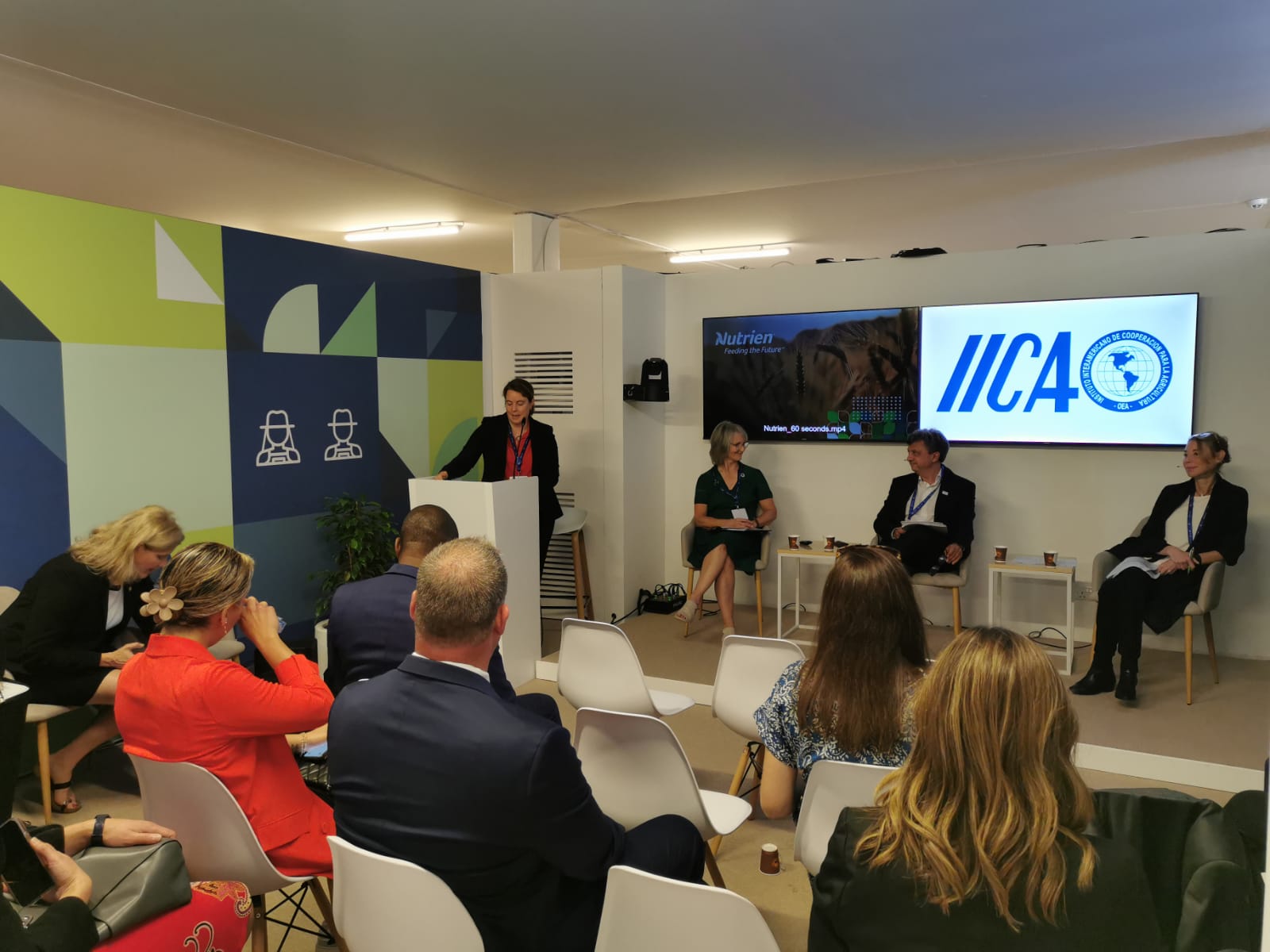Representatives of the Argentine Association of Direct Seeding Producers (AAPRESID), the Canadian firm Nutrien, the world’s largest provider of agricultural inputs, and the International Emissions Trading Association (IETA, also from Canada) took part in an activity at the Home of Sustainable Agriculture of the Americas (IICA’s pavilion at COP28), where they highlighted the importance of collaborative efforts in achieving zero emissions in the agrifood value chain in order to make production more sustainable and promote food safety.

Dubai, United Arab Emirates, 8 December 2023 (IICA). In an event held at the pavilion of the Inter-American Institute for Cooperation on Agriculture (IICA) at COP28, the world’s most important climate change summit, farming organizations from countries in the Americas called for the application of science-based environmental impact indicators to agriculture in the hemisphere, which should be agreed with and formally endorsed by farmers as part of innovation processes designed to make the region’s agriculture more sustainable.
Representatives of the Argentine Association of Direct Seeding Producers (AAPRESID), the Canadian firm Nutrien, the world’s largest provider of agricultural inputs, and the International Emissions Trading Association (IETA, also from Canada) took part in an activity at the Home of Sustainable Agriculture of the Americas (IICA’s pavilion at COP28), where they highlighted the importance of collaborative efforts in achieving zero emissions in the agrifood value chain in order to make production more sustainable and promote food safety.
Margaret Zeigler, IICA’s Representative in the United States, opened the meeting, which was moderated by Sophie Beecher, Director General of Sustainable Development Policy at Agri-Food Canada (Canada’s Ministry of Food and Agriculture).
“We consider it essential that producers be involved in these talks, which involve charting a path towards a more sustainable form of production. We believe the most important condition is that producers be involved in the innovation processes, and that the discussions be based on science and technology”, affirmed the President of AAPRESID, Marcelo Torres.
During the discussion, Torres also explained that they aim to “build a trustworthy channel from the field to the consumer”, offering consumers more and better options based on environmental criteria.
“So that their consumption habits allow us to scale up these production models; and also so that crop farmers and stock raisers are more motivated, realizing they can reach other markets because what they produce has greater value because of its environmental footprint”, he added.
Torres said that in recent years more associations of agricultural producers had been attending the COPs (Conferences of the Parties to the United Nations Framework Convention on Climate Change), and the discussions on agriculture at the global summits “are becoming a little more science based”.
“We’re increasingly finding that farmers are involved in more discussions. “We’re slowly beginning to discuss data and processes, rather than ideas”, the President of AAPRESID observed.
On this subject, the Director General of IICA, Manuel Otero, remarked that: “Our position is that science should be the basis for all the decisions that need to be taken to enable agriculture to increase its contribution to mitigation and adaptation, as the sector is a key factor in the solutions to climate change. Agricultural producers must be at the heart of all policies aimed at achieving this objective, since they give life to agricultural systems that are not failed systems, although they can be improved”.
The challenge of working together
Michelle Nutting, Director of Agricultural and Environmental Sustainability at Nutrien, described how her company was faced with the challenge of promoting the concept of carbon measurement among the different actors in its production chain, which required all parties to work together.
“One of the first challenges was to create trustworthy partnerships, so we could make progress in measuring and reducing emissions together, and then have a third organization validate our actions in order to scale them up. This was also challenging, because the validation and verification organizations that exist do not have much experience with agriculture; education is needed in this field”, Nutting explained.
“[Emissions measurement) is a decision that involves risks, as there is no single path to follow. It requires commitment from producers, suppliers, etc., and lots of effort, learning, resources and time”, added Katie Sullivan, Managing Director of IETA.
AAPRESID’s Marcelo Torres stressed that producer organizations’ insistence on carbon emissions indicators being science based also highlights the need for increased productivity, without which global food security will be difficult to achieve.
“The pressure on the balance between supply and demand following Russia’s invasion of Ukraine made us realize that the balance is really very tight, that we have to care for the planet, but with levels of productivity that allow us to continue meeting the growing demand”, he said.
The Argentine producer emphasized that it is up to the agriculture sector to ensure that this message is widely disseminated at the COPs. “The summit is the best place for people from all over the world, drawn from all human activities, to discuss how we can continue to meet the growing demand in a way that impacts the planet less”, he explained.
More information:
Institutional Communication Division.
comunicacion.institucional@iica.int











